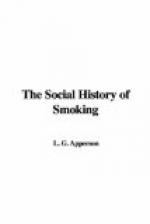But to turn from this worthy Exeter citizen to more famous names: I do not know of any good evidence as to whether or not Cromwell smoked, although he is said to have taken an occasional pipe while considering the offer of the crown, but John Milton certainly did. The account of how the blind poet passed his days, after his retirement from public office, was first told by his contemporary Richardson, and has since been repeated by all his biographers. His placid day ended early. The poet took his frugal supper at eight o’clock, and at nine, having smoked a pipe and drunk a glass of water, he went to bed. Apparently this modest allowance of a daily evening pipe was the extent of Milton’s indulgence in tobacco. He knew nothing of what most smokers regard as the best pipe of the day—the after-breakfast pipe.
It is somewhat singular that the Puritans, who denounced most amusements and pleasures, and who frowned upon most of the occupations or diversions that make for gaiety and the enjoyment of life, did not, as Puritans, denounce the use of tobacco. One or two of their writers abused it roundly; but these were not representative of Puritan feeling on the subject. The explanation doubtless is that the practice of smoking was so very general and so much a matter of course among men of all ranks and of all opinions, that the mouths of Puritans were closed, so to speak, by their own pipes. A precisian, however, could take his tobacco with a difference. The seventeenth-century diarist, Abraham de la Pryme, says that he had heard of a Presbyterian minister who was so precise that “he would not as much as take a pipe of tobacco before that he had first sayed grace over it.” George Wither, one of the most noteworthy of the poets who took the side of the Parliament, was confined in Newgate after the Restoration, and found comfort in his pipe.
Some of the Puritan colonists in America took a strong line on the subject. Under the famous “Blue Laws” of 1650 it was ordered by the General Court of Connecticut that no one under twenty-one was to smoke—“nor any other that hath not already accustomed himself to the use thereof.” And no smoker could enjoy his pipe unless he obtained a doctor’s certificate that tobacco would be “usefull for him, and allso that he hath received a lycense from the Courte for the same.” But the unhappy smoker having passed the doctor and obtained his licence was still harassed by restrictions, for it was ordered that no man within the colony, after the publication of the order, should take any tobacco publicly “in the streett, highwayes, or any barn-yardes, or uppon training dayes, in any open places, under the penalty of six-pence for each offence against this order.” The ingenuities of petty tyranny are ineffable. It is said that these “Blue Laws” are not authentic; but if they are not literally true, they are certainly well invented, for most of them can be paralleled and illustrated by laws and regulations of undoubted authenticity.




